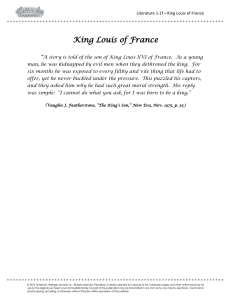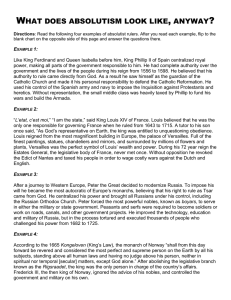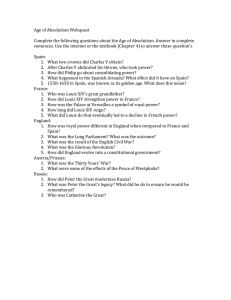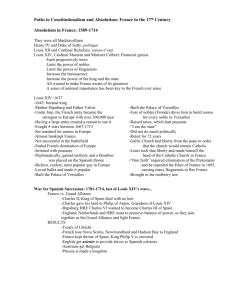Modern European History
advertisement
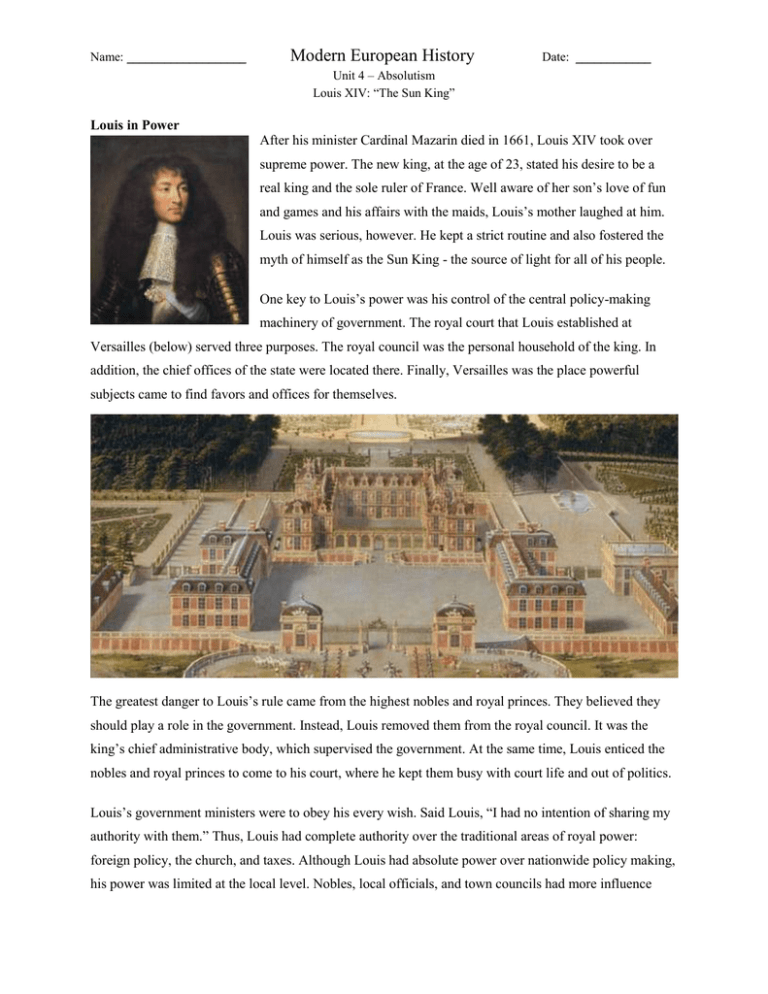
Name: ___________________ Modern European History Date: ____________ Unit 4 – Absolutism Louis XIV: “The Sun King” Louis in Power After his minister Cardinal Mazarin died in 1661, Louis XIV took over supreme power. The new king, at the age of 23, stated his desire to be a real king and the sole ruler of France. Well aware of her son’s love of fun and games and his affairs with the maids, Louis’s mother laughed at him. Louis was serious, however. He kept a strict routine and also fostered the myth of himself as the Sun King - the source of light for all of his people. One key to Louis’s power was his control of the central policy-making machinery of government. The royal court that Louis established at Versailles (below) served three purposes. The royal council was the personal household of the king. In addition, the chief offices of the state were located there. Finally, Versailles was the place powerful subjects came to find favors and offices for themselves. The greatest danger to Louis’s rule came from the highest nobles and royal princes. They believed they should play a role in the government. Instead, Louis removed them from the royal council. It was the king’s chief administrative body, which supervised the government. At the same time, Louis enticed the nobles and royal princes to come to his court, where he kept them busy with court life and out of politics. Louis’s government ministers were to obey his every wish. Said Louis, “I had no intention of sharing my authority with them.” Thus, Louis had complete authority over the traditional areas of royal power: foreign policy, the church, and taxes. Although Louis had absolute power over nationwide policy making, his power was limited at the local level. Nobles, local officials, and town councils had more influence than the king in the daily operation of local governments. As a result, the king bribed important people in the provinces to see that his policies were carried out. Desiring to maintain religious harmony as part of the monarchical power in France, Louis pursued an anti-Protestant policy aimed at converting the Huguenots to Catholicism. Early in his reign, Louis ordered the destruction of Huguenot churches and the closing of their schools. As many as 200,000 Huguenots fled to England, the United Provinces, and the German states. The cost of building palaces, maintaining his court, and pursuing his wars made finances a crucial issue for Louis XIV. He was most fortunate in having the services of Jean-Baptiste Colbert as controllergeneral of finances. Colbert sought to increase France’s wealth and power by following mercantilism. To decrease imports and increase exports, he granted subsidies to new industries. To improve communications and the transportation of goods within France, he built roads and canals. To decrease imports directly, Colbert raised tariffs on foreign goods and created a merchant marine to carry French goods. To increase his royal power, Louis developed a standing army numbering 400,000 in time of war. He wished to achieve the military glory befitting the Sun King and ensure that his Bourbon dynasty dominated Europe. To achieve his goals, Louis waged four wars between 1667 and 1713. Many nations formed coalitions to prevent him from dominating Europe. Through his wars, Louis added some territory and set up a member of his own dynasty on the throne of Spain. Legacy of Louis XIV In 1715, the Sun King died. He left France surrounded by enemies and many of the French people in poverty. On his deathbed, the 76-year-old monarch seemed remorseful when he told his successor (his great- grandson), “You are about to become a great king. Do not imitate me either in my taste for building or in my love of war. Live in peace with the nations. . . . Strive to relieve the burdens of your people in which I have been so unfortunate as to fail.” Did Louis mean it? We do not know. In any event, his successor probably did not remember this advice; Louis’s great-grandson was only five years old. Louis XIV to his Chancellor (1661) “ [Up] to this moment I have been pleased to entrust the government of my affairs to the late Cardinal. It is now time that I govern them myself. You [secretaries and ministers of state] will assist me with your counsels when I ask for them… . I request and order you to seal no orders except by my command… . I order you not to sign anything, not even a passport . . . without my command; to render account to me personally each day and to favour no one.” ~ Louis XIV, quoted in Princes and Peoples 2 “A DAY IN THE LIFE OF LOUIS XIV” For much of his reign, Louis XIV resided at the palace of Versailles. There he established a lavish court, which the country’s leading nobles were expected to attend. Life at Versailles revolved around the king, and the simplest events of his day, such as getting dressed or going to bed, were accompanied by pomp and ceremony in which the court was required to take part. In the excerpt below from “The Memoirs of SaintSimon,” one of Louis’ courtiers [nobles who live at “court” in Versailles], the Duc de Saint-Simon, describes a typical day’s at Versailles. As you read the excerpt, consider what the day’s activities tell you about the character of Louis XIV. At eight o’ clock every morning the King was awoken by his First Valet-de-Chambre [personal servant], who slept in the room with him. At the same time the First Physician and First Surgeon were admitted; and as long as she lived the King’s former wet-nurse also came in and would kiss him. He would then be rubbed down, because he perspired a great deal. At a quarter past eight the Great Chamberlain was admitted, together with those members of the court who had the grandes entrees [rights to speak to the king first in the morning]. The Great Chamberlain then opened the curtains round the bed... and offered him holy water from a stoup at the head of the bed. This was the chance for any courtier who wished to ask a favor or to speak to the King, and if one did so the others with drew to a distance. The Chamberlain then handed the King the book of the Office of the Holy Ghost, and having done so retired to the next room with everyone else. The King said the Office...and then, putting on his dressing gown, summoned them back into the room; meanwhile the second entrée [group of nobles to watch the king] was admitted and, a few minutes later, the body of the court. By the time they came in the King was getting into his breeches (for he put on nearly all his clothes himself), which he accomplished with considerable grace. He was shaved every other day, with the court watching; while it was being done he wore a short wig, without which he never allowed himself to be seen...While his barber was at work he sometimes talked to those around him, about hunting or some other light topic. He had no dressing-table at hand, only a servant who held up a glass [mirror] for him. When he had finished dressing he knelt down at the side of his bed and said his prayers....Next the King went into his study, followed by this privilege, amounted to quite a gathering. He then announced his appointments for the day, so that everyone knew what he would be doing every quarter of an hour. Then the room was cleared.... The courtiers waited in the Gallery until the king was ready to go to Mass, at which the choir always sang a motet [slow song]. The ministers were told as soon as he had gone to the chapel, and they then gathered in the King’s study.... As soon as Mass was over the Council met, and that was the last engagement for the morning. One or other of the Councils met every day except Thursdays and Fridays—that is to say, the King ate alone in his bedroom.... The meal was substantial whether he had ordered petit couvert [a small meal] or tres-petit couvert [a very small meal], for even the latter consisted of three courses, each made up of several different dishes.... 3 Monsieur [the King’s brother] often attended, and when present always handed the King his napkin and then remained standing. If the King saw that he intended to remain, he would ask him if he wished to be seated: Monsieur would bow... and sit down. He would remain seated until the end of the meal, when he would again hand the King his napkin.... As soon as he had finished his dinner the King rose from the table and went into his study, where he spent time feeding his pointers and playing with them. Then he changed... after which he went down to the Marble Court by his own private staircase... He liked fresh air, and if he could not get it he suffered from headaches and vapours, which had originally been caused by too much perfume—with the consequence that for years he had not cared for anything except orange water, and anyone who was going to approach him had to very careful about this. He felt neither heat nor cold, and wet weather affected him very little—it had to be very bad indeed to stop him from going out. At least once a week, and more if he were at [his estates at] Marly or Fontainebleau, he went stag-hunting. Once or twice a week he shot his own coverts, usually choosing Sundays or feast-days when there were no works for him to inspect; he was a first class shot. Most other day he would walk round having a look at whatever building was in progress. Occasionally he would take ladies out and have a picnic in the forests of Marly or Fontainebleau.... If there was no Council he often went over to Marly or Trianon for dinner.... After dinner one of the Ministers usually came in with some work, and when that was done he would pass the rest of a summer afternoon strolling with the ladies or playing cards. Sometimes he would get up a lottery in which there were no blanks, and every ticket drew a prize of plate, jewelry, or a dress length of rich material, which was a delicate way of making presents to the ladies about him.... The King’s supper was served, always au grand couvert [a grand or large meal], at ten o’ clock, and the entire Royal Family sat down with him. [A frequent complaint was that the King was late and the meal often did not start until eleven-thirty.] The meal was attended by a large number of people, both those who were entitled to be seated and those who were not.... After supper the King would stand by the balustrade at the foot of his bed for a few minutes, with the whole court about him; then he would bow to the ladies and retire into his study, where he played for an hour or so with this children and grandchildren.... Before he retired to bed the King went to feed his dogs; then he said good-night and, going into his room, knelt down at his bedside to say his prayers. After he had undressed he would bow, which meant ‘Good- night,’ and at that sign all the court retired. As they filed out he, standing by the fire-place, gave the password to the Captain of the Guard. It was the last opportunity for the day of speaking to the King, and if anyone stepped forward the others withdrew at once and left him alone with the King. 4
